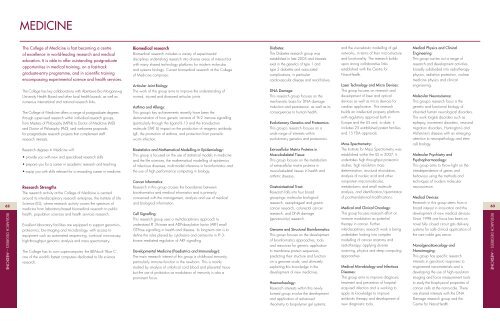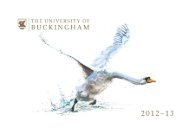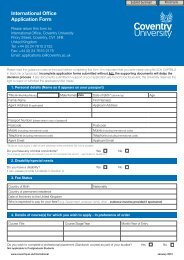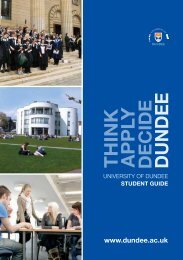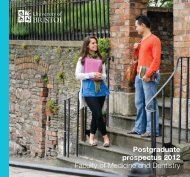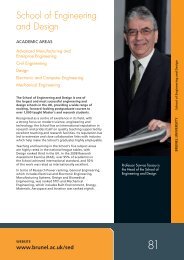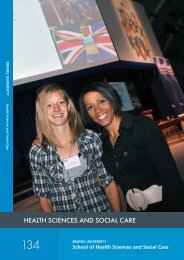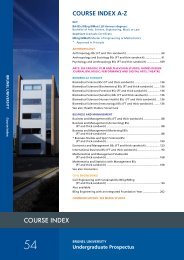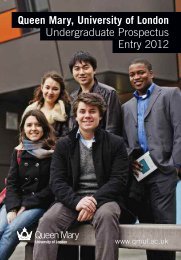www.swansea.ac.uk Postgraduate Prospectus 2012
www.swansea.ac.uk Postgraduate Prospectus 2012
www.swansea.ac.uk Postgraduate Prospectus 2012
- No tags were found...
You also want an ePaper? Increase the reach of your titles
YUMPU automatically turns print PDFs into web optimized ePapers that Google loves.
MEDICINE62RESEARCH DEGREES – MEDICINEThe College of Medicine is fast becoming a centreof excellence in world-leading research and medicaleducation. It is able to offer outstanding postgraduateopportunities in medical training, on a fast-tr<strong>ac</strong>kgraduate-entry programme, and in scientific trainingencompassing experimental science and health services.The College has key collaborations with Abertawe Bro MorgannwgUniversity Health Board and other local health boards, as well asnumerous international and national research links.The College of Medicine offers a range of postgraduate degreesthrough supervised research within individual research groups,from Masters of Philosophy (MPhil) to Doctor of Medicine (MD)and Doctor of Philosophy (PhD), and welcomes proposalsfor postgraduate research projects that complement staffresearch interests.Research degrees in Medicine will:• provide you with new and specialised research skills• prepare you for a career in <strong>ac</strong>ademic research and te<strong>ac</strong>hing• equip you with skills relevant for a rewarding career in medicine.Research StrengthsThe research <strong>ac</strong>tivity at the College of Medicine is centredaround its interdisciplinary research enterprise, the Institute of LifeScience (ILS), where research <strong>ac</strong>tivity covers the spectrum ofmedicine from laboratory-based biomedical research to publichealth, population sciences and health services research.Excellent laboratory f<strong>ac</strong>ilities are equipped to support genomics,proteomics, bio-imaging and microbiology, with <strong>ac</strong>cess toequipment such as automated sequencing, confocal microscopy,high-throughput genomic analysis and mass spectrometry.The College has its own supercomputer, the IBM-built ‘Blue C’,one of the world’s fastest computers dedicated to life scienceresearch.Biomedical researchBiomedical research includes a variety of experimentaldisciplines undertaking research into diverse areas of interest butwith many shared technology platforms for modern molecularand systems biology. Current biomedical research at the Collegeof Medicine comprises:Articular Joint Biology:The work of this group aims to improve the understanding ofnormal, injured and diseased articular joints.Asthma and Allergy:This group’s key <strong>ac</strong>hievements recently have been thedemonstration of how genetic variants of Th-2 immune signalling(particularly through the ligand IL-13 and the transductionmolecule STAT 6) imp<strong>ac</strong>t on the production of reagenic antibodyIgE, the promotion of asthma, and protection from parasiticworm infection.Biostatistics and Mathematical Modelling in Epidemiology:This group is focused on the use of statistical models in medicineand the life sciences, the mathematical modelling of epidemicsof infectious diseases, multi-model inference in bioinformatics andthe use of high performance computing in biology.Cancer Informatics:Research in this group crosses the boundaries betweenbioinformatics and medical informatics and is primarilyconcerned with the management, analysis and use of medicaland biological information.Cell Signalling:This research group uses a multidisciplinary appro<strong>ac</strong>h tounderstand PI 3-kinase and ADPribosylation f<strong>ac</strong>tor (ARF) smallGTPase signalling in health and disease. Its long-term aim is todefine the roles played by cytohesins and centaurins in PI 3-kinase mediated regulation of ARF signalling.Developmental Medicine (Paediatrics and Immunology):The main research interest of this group is childhood immunity,particularly immune function in the newborn. This is mainlystudied by analysis of umbilical cord blood and pl<strong>ac</strong>ental tissuebut the use of probiotics as modulators of immunity is also aprominent focus.Diabetes:The Diabetes research group wasestablished in late 2005 and interestsexist in the genetics of type 1 andtype 2 diabetes and associatedcomplications, in particularcardiovascular disease and renal failure.DNA Damage:This research group focuses on themechanistic basis for DNA damageinduction and persistence, as well as itsconsequences to human health.Evolutionary Genetics and Proteomics:This group’s research focuses on awide range of interests withinevolutionary genetics and proteomics.Extr<strong>ac</strong>ellular Matrix Proteins inMusculoskeletal Tissue:This group focuses on the metabolismof extr<strong>ac</strong>ellular matrix proteins inmusculoskeletal tissues in health andarthritic disease.Gastrointestinal Tr<strong>ac</strong>t:Research falls into four broadgroupings: molecular biologicalresearch, oesophageal and gastriccancer research, colorectal cancerresearch, and DNA damage(genotoxicity) research.Genome and Structural Bioinformatics:This group focuses on the developmentof bioinformatics appro<strong>ac</strong>hes, toolsand resources for generic applicationto membrane protein sequences,predicting their structure and functionon a genome scale, and ultimatelyexploiting this knowledge in thedevelopment of new medicines.Haemorheology:Research interests within this newlyformed group involve the developmentand application of advancedrheometry to biopolymer gel systems;and the viscoelastic modelling of gelnetworks, in terms of their microstructureand functionality. The research buildsupon strong collaborative linksestablished with the Centre forNanoHealth.Laser Technology and Micro Devices:This group focuses on research anddevelopment of laser and opticaldevices as well as micro devices forcardi<strong>ac</strong> application. This researchbuilds an intellectual property platformwith regulatory approval both inEurope and the US and, to date, itincludes 25 established patent familiesand 15 FDA approvals.Mass Spectrometry:The Institute for Mass Spectrometry wasestablished within the ILS in 2007. Itundertakes high throughput proteomicstudies, high resolution massdetermination, structural elucidation,analysis of nucleic <strong>ac</strong>id and othernonprotein m<strong>ac</strong>romolecules,metabolomic and small moleculeanalysis, and identification/quantitationof post-translational modifications.Medical and Clinical Oncology:This group focuses research effort onimmune modulation as potentialtherapy in cancer. Furtherinterdisciplinary research work is beingundertaken looking into complexmodelling of cancer anatomy andradiotherapy, applying diversescanning, physics and deep computingappro<strong>ac</strong>hes.Medical Microbiology and InfectiousDiseases:This group aims to improve diagnosis,treatment and prevention of hospital<strong>ac</strong>quiredinfection and is working toapply its knowledge to improveantibiotic therapy and development ofnew diagnostic tools.Medical Physics and ClinicalEngineering:This group carries out a range ofresearch and development <strong>ac</strong>tivitiesbroadly subdivided into radiotherapyphysics, radiation protection, nuclearmedicine physics and clinicalengineering.Molecular Neuroscience:This group’s research focus is thegenetic and functional biology ofinherited human neurological disorders.The work targets disorders such asepilepsy, movement disorders, neuronalmigration disorders, Huntington’s andAlzheimer’s disease with an emergingattention to neuropathology and stemcell biology.Molecular Psychiatry andPsychopharm<strong>ac</strong>ology:This group aims to throw light on theinterdependence of genes andbehaviour using the methods andtechniques of modern molecularneuroscience.Medical Devices:Research in this group stems from abroad interest in innovation and thedevelopment of new medical devices.Since 1998 one focus has been onnovel fully closed circuit gas deliverysystems for safe clinical application ofthe rare noble gas xenon.Nano(geno)toxicology andNanoimaging:This group has specific researchinterests in genotoxic responses toengineered nanomaterials and isdeveloping the use of high resolutionimaging and force measurement toolsto study the biophysical properties ofcancer cells at the nanoscale. Thereare shared interests with the DNADamage research group and theCentre for NanoHealth.63RESEARCH DEGREES – MEDICINE


